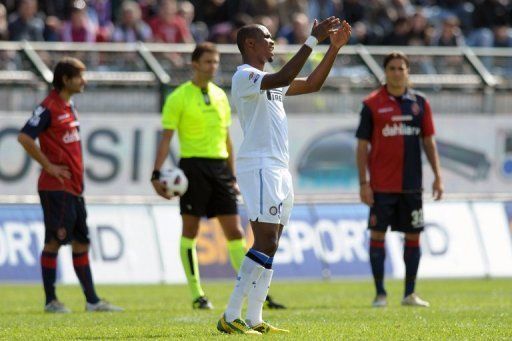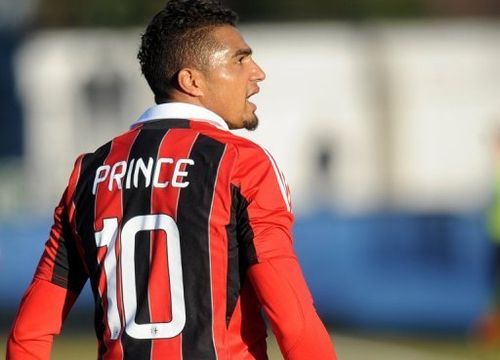
UEFA backs referees stopping matches for racism
SOFIA (AFP) –

Inter Milan‘s then forward Samuel Eto’ (C) shows his anger as Cagliari supporters shout racial chants while the referee holds stops the Serie A match at Sant’Elia stadium in Cagliari, Italy on October 17, 2010. UEFA reiterated its zero-tolerance policy on racism at a meeting in Sofia on Thursday, encouraging referees to halt matches if need be and encouraging teams to denounce racism.
UEFA reiterated its zero-tolerance policy on racism on Thursday, encouraging referees to halt matches if need be and encouraging teams to denounce racism among fellow players and fans.
UEFA’s executive committee said it “recommends and fully supports referees to stop matches in cases of racism and calls on national associations and leagues to do the same,” in a resolution drawn up by the Professional Football Strategy Council (PFSC) and ratified Thursday.
European football’s governing body also called “on the players and coaches — namely those with most influence on the perpetrators of racist acts — to speak out, even if this may mean criticising their own fans or players.”
The document was jointly adopted with the European Clubs Association (ECA) and the world players’ union FIFPro.
In January, AC Milan‘s Ghana international Kevin-Prince Boateng caused a sensation when he walked off the pitch during a friendly match against Italian fourth division side Pro Patria after being showered with racist abuse by opposing fans.
Several football officials, coaches and players spoke out against racism at games but some criticised Boateng’s move, saying that walking out was not a solution.

AC Milan’s Kevin-Prince Boateng shouts towards fans during his side’s friendly match against fourth-tier club Pro Patria in Busto Arsizio, Italy on January 3, 2013. Boateng caused a sensation when he walked off the pitch during the friendly match after being showered with racist abuse by opposing fans.
“Many countries have taken significant and successful action but… such incidents are still widespread in our continent,” UEFA said Thursday.
It urged national leagues and disciplinary bodies to apply “stricter sanctions in cases of proven racism” to prevent recurrent offences and called on authorities “to play their part” and “arrest, prosecute and ban from stadia for significant periods those responsible for racist acts.”
At a press conference, UEFA general secretary Gianni Infantino noted that since 2009, referees already had several options to deal with racist incidents, from a brief stoppage of play time to suspension of the game with the team responsible for the interruption forced to forfeit.
UEFA President Michel Platini meanwhile threatened lifetime bans for anyone involved in match-fixing, a problem that has increasingly affected the sport.
“When we have something big and proof of corruption in games, the result will be zero tolerance, meaning the person involved will never play football again,” Platini told journalists after the meeting.
“I count on you, on the whole football world to eradicate this scourge. We will show no mercy to the people who infringe the rules of the game — players, referees, officials — it will be zero tolerance,” he added.
UEFA had called in Sofia for greater help from national authorities to fight match-fixing, including setting up prosecution teams dedicated only to sports fraud.
“Sports bodies do not have the means or the legal jurisdictions to tackle by themselves a problem, which often involves criminal organisations,” it said in a statement.
“‘Sports fraud’ should therefore be recognised as a specific criminal offence in national legislations throughout Europe, as this would help to ensure a consistent, effective and coordinated means to deter match-fixing.”
Tackling the problem was “an absolute priority,” it said, presenting a six-point action plan that includes whistle-blowing procedures, clear bans on betting for players, coaches and referees and continued monitoring of competitions to detect fraud.